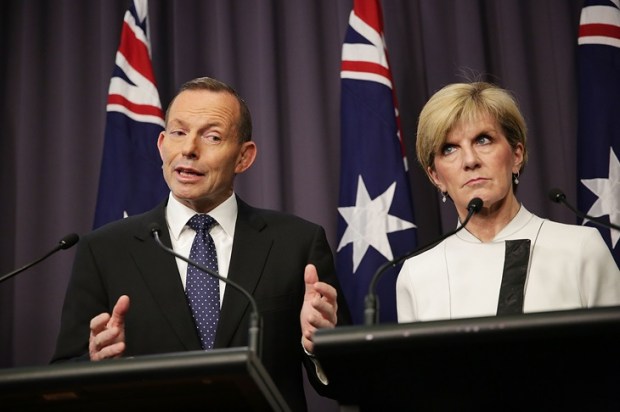It was a good call when Western Civilisation decided to erect a wall between religion and politics, protecting both spheres of human interest from each other’s ambition.
In the modern century, we might have to think about adding some fresh protections for science – not only from politicians, who have proved themselves wholly unworthy – but also from church leaders.
While there is a genuine danger that self-interested scientific exploration, that answers to nothing but physical possibility, could lead humanity into danger, more frightening is a future where science is leashed as a guard dog to those who believe they are pursuing the ‘greater good’.
There are a few groups keen to use the authority of science to further their interests, not least among them international socialist bureaucracies such as the United Nations that perceive themselves to be the de facto inheritors of human civilisation.
Perhaps seeking relevance in a world rapidly falling under the spell of godless Marxism, the Pope has inserted himself into the conversation.
The Pope’s AI adviser (yes, he has one of those), Franciscan monk Paolo Benanti, has taken an interest in ensuring that the world of rapidly evolving AI algorithms ‘respect human dignity’.
He has conducted courses on sexual morality and bioethics, neuroethics, technology ethics, artificial intelligence, and post-human intelligence. Benanti’s work includes developing an ethical framework for ‘algocracy’ – which is the idea of ‘government by algorithm’. It is a proposed form of government, similar to that of 1984, where those in power rule via the use of information collected about society. This is processed by intelligent algorithms that transform us into a ‘social machine’. Think social media except that it follows you home.
During his collaboration with political philosopher Sebastiano Maffettone, Benanti delved into the future of humanity depicted as a hybrid reality ‘between utopia and dystopia’ that he called paraferno, no doubt inspired by Dante’s Inferno.
To quote the Italian journals published in Corriere della sera, paraferno explores, ‘The vital, relational, social and communicative, labour and economic dimension, seen as a result of an interaction, with complex ethical implications, between the resources offered by the vital and interactive reality and social and individual existence.’
Under the Pope’s guidance, Benanti is responsible for a project called ‘Rome Call’ which is an ethics-based observer framework that seeks to keep the Catholic Church engaged in the spiritual evolution of the digital world.
As a marketing ploy, it’s not a half-bad idea. Whether or not the church has any genuine power over the technological arms race is a different question.
Rome Call was founded in 2020 via a partnership with signatories IBM, Microsoft, the Pontifical Academy for Life, FAO, and the Italian Ministry of Innovation. Essentially it is a document that ‘calls for AI ethics’ – like Asimov’s Three Laws of Robots, but less practical.
There’s nothing wrong with the concept of ethical technology, although it really does depend on whose ethics we are talking about. As many science fiction novelists have warned, some of the most terrifying AI technology imaginable was based on ‘the greater good’.
Stated in its digital manifesto, Rome Call highlights ethics, education, and rights as its three major concerns, with six subcategories consisting of transparency, inclusion, accountability, impartiality, reliability, and security and privacy.
It all sounds great until you pick through the detail and find a few of those alarming buzz words more common to international socialists and big-business lobbying groups addicted to climate money…
While many perceive the Catholic Church as either entrenched in its ancient stone cathedrals or bowing down to the increasingly powerful new gods of ‘Woke’ – the Pope has taken a particular interest in the world’s largest tech lobbying groups as a way to prove that religion can comfortably sit on the right hand of power.
Pope Francis is a contributor to the World Economic Forum and has made several addresses to Davos. Without seeming to recognise the hypocrisy, he said:
‘Together with this, we encounter certain rather selfish lifestyles, marked by an opulence which is no longer sustainable and frequently indifferent to the world around us … so too artificial intelligence, robotics, and other technological innovations must be so employed that they contribute to the service of humanity and to the protection of our common home.’
The Pope also asked Catholics to pray that AI technology ‘serves humanity’.
He is a man wholly onboard with The Great Reset and was heard saying that he wanted to see an end to the ‘dogma of neoliberal faith’ because ‘the fragility of world systems in the face of the [Covid] pandemic has demonstrated that not everything can be resolved by market freedom’ and that we needed ‘alternative social structures’. He even asked for a ‘better kind of politics’ that serves the ‘common good’ – whatever that looks like.
No one seems to notice that the world’s largest communist nation remains in the grip of Covid insanity while the West, with its ‘evil market economy’, is beginning to recover. This comes with the truth slowly being acknowledged that the West wouldn’t have skipped a beat if it had been left to its own devices rather than suffocated under the momentary socialism of panicked leaders.
Now that the dust of Covid has settled, Rome Call is re-awakening.
We find speeches in its honour imploring society to be ‘more trustful’ of an AI future to make a more ‘inclusive’ and ‘equal’ world. If the Pope wants to ensure an ethical technological future, the first thing he should do is cease interacting with the World Economic Forum, whose policies currently represent the greatest threat to global human liberty history has ever seen.
But if we are going to talk about specifics, Rome Call insists:
‘All human beings are born free and equal in dignity and rights. […] This must be done by safeguarding the rights and freedom of individuals so that they are not discriminated against by algorithms due to their “race, colour, sex, language, religion, political, or other opinion, national or social origin, property, birth or other status”.’
In the words of Pauline Hanson, please explain why the Vatican happily employed AI vaccine passport systems on their grounds with the specific purpose of segregation and discrimination…
The Vatican talked their way around the violation of rights by insisting it was ‘affirmed that it is necessary to ensure the health and wellness of the work Community in respect of the dignity, rights, and fundamental liberty of every member’.
So-called public health immediately overrode their ethical concerns regarding technology, just as ‘environmental concerns’ will override human rights when we get into the nitty gritty of Climate Change algorithms.
Not only were vaccine passports a violation of medical privacy and human rights, but they were also completely and utterly useless in stopping the spread of Covid. They serve as the perfect example of profitable, politically coercive technology being regulated through law in the name of ‘the public good’. It is exactly how organisations make the ethical argument for abuse.
‘As we recover from the Covid pandemic, the Rome Call will be even more important as we think more broadly and ethically about the future of technology. The Rome Call helps put us on this path to promote thoughtful, respectful, and inclusive conversation about the intersection of artificial intelligence technology and society,’ said Brad Smith, president of Microsoft.
‘In order for technological advancement to align with true progress for the human race and respect for the planet, it must meet three requirements. It must include every human being, discriminating against no one; it must have the good of humankind and the good of every human being at its heart; finally, it must be mindful of the complex reality of our ecosystem and be characterised by the way in which it cares for and protects the planet (our “common and shared home”) with a highly sustainable approach, which also includes the use of artificial intelligence in ensuring sustainable food systems in the future.’ – Rome Call declaration.
Aside from the scary environmental stuff buried in there, the idea that technology will ‘exclude no one’ by default means it will be an all-inclusive digital system – that you cannot opt-out of. This sounds awfully like the World Economic Forum’s global digital identity system.
You’ve got to be careful with ‘inclusivity’ if it comes as a threat rather than an offer.
Most technology is market-driven and consumer-based. It is benign in that the products created by companies have no interest in the ‘greater social issues’. They exist for a confined purpose. No one stands over you and beats you into submission until you buy an iPhone. Well… China might. Smart phones are required for citizens to interact with their ‘inclusive’ social credit surveillance system. It is an example of state-coerced digital inclusivity.
‘At FAO, we use ethical AI in our work for Better Production, Better Nutrition, a Better Environment, and a Better life,’ said FAO Director-General QU Dongyu, speaking for Rome Call.
The only thing they left out was ‘Build Back Better’.
Got something to add? Join the discussion and comment below.
Get 10 issues for just $10
Subscribe to The Spectator Australia today for the next 10 magazine issues, plus full online access, for just $10.


























Comments
Don't miss out
Join the conversation with other Spectator Australia readers. Subscribe to leave a comment.
SUBSCRIBEAlready a subscriber? Log in